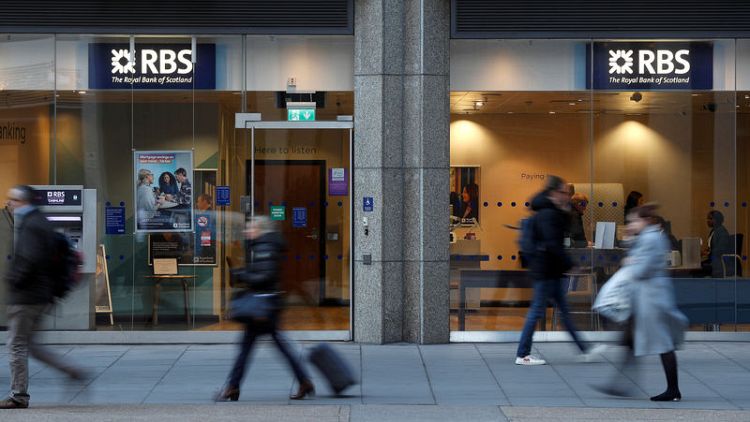By Iain Withers and Lawrence White
LONDON (Reuters) - Royal Bank of Scotland <RBS.L> on Friday said deteriorating economic conditions before Brexit were likely to derail next year's profitability and cost targets after it reported strong first-half results, including a 1.7 billion pound dividend.
RBS warned that in the first of the year some of its consumers and businesses were struggling as the chances rise of a disorderly departure from the European Union.
The state-controlled bank said a tough outlook would make it "very unlikely" it would meet its target of achieving a 12% plus return on tangible equity - a measure of profitability.
RBS, which has undergone a major turnaround since a 45 billion pound bailout in the financial crisis a decade ago, said it would struggle to reduce its cost to income ratio to below 50% by 2020, although this remained its medium term goal.
The bank's shares fell as much as 5% in early trading, against a 2.5 % drop in the STOXX European banks index <.SX7P>.
The results show how outgoing CEO Ross McEwan has put RBS on a surer financial footing, but his successor will now face major challenges, including steering RBS through any economic fallout from Brexit and returning the lender to private hands.
RBS was able to announce the 1.7 billion pound windfall for investors via dividends after the sale of a stake in Saudi bank Alawwal helped to support a 48% increase in first-half pretax profits to 2.7 billion pounds.
The British government - which still owns 62% of the RBS - will receive 1 billion pounds.
RBS said its overall lending business remained healthy, but it reported an increase in bad loans of 182 million pounds for the first half compared with the previous year.
RBS also said there was a modest increase in default rates among personal banking customers, a decline in property valuations in the retail sector and large companies delaying financing due to Brexit uncertainty.
The bank also became the latest lender to warn of pressure on margins due to intense pricing competition in mortgages, after similar warnings from Barclays <BARC.L>, Lloyds <LLOY.L> and CYBG <CYBGC.L>.
RBS's net interest margin - a measure of underlying profitability - fell to 2.04%, down from 2.07% the previous quarter and 2.02% the previous year.
CEO SEARCH
RBS gave no update on its search for a new CEO to replace McEwan.
McEwan, 62, said in April he planned to retire within the next year, but the hunt to replace him has intensified after National Australia Bank <NAB.AX> said last month that he would become its next chief executive.
RBS business banking boss Alison Rose is widely seen as the leading internal candidate for the job. External contenders approached about the role have included HSBC <HSBA.L> UK chief Ian Stuart and Whitbread CEO Alison Brittain according to recent media reports.
McEwan's departure is the second major change in RBS's senior executive team in quick succession following the appointment of Katie Murray as the bank's chief financial officer last December.
The bank is also still battling to restore its public image after a string of crisis-era scandals.
Excluding a 700 million pound boost from the sale of RBS's Alawwal stake, RBS pretax profits of 2 billion pounds only narrowly beat forecasts of 1.9 billion pounds, according to a company-compiled average of analyst estimates.
The bank followed up on its first full-year dividend in a decade with an interim dividend of 2 pence per share and a special dividend of 12 pence.
The payouts were more generous than expected, after analysts had pencilled in 1 billion pounds of payouts in dividends and share buy backs for the first half.
(Reporting by Iain Withers and Lawrence White; Editing by Rachel Armstrong and Jane Merriman)



